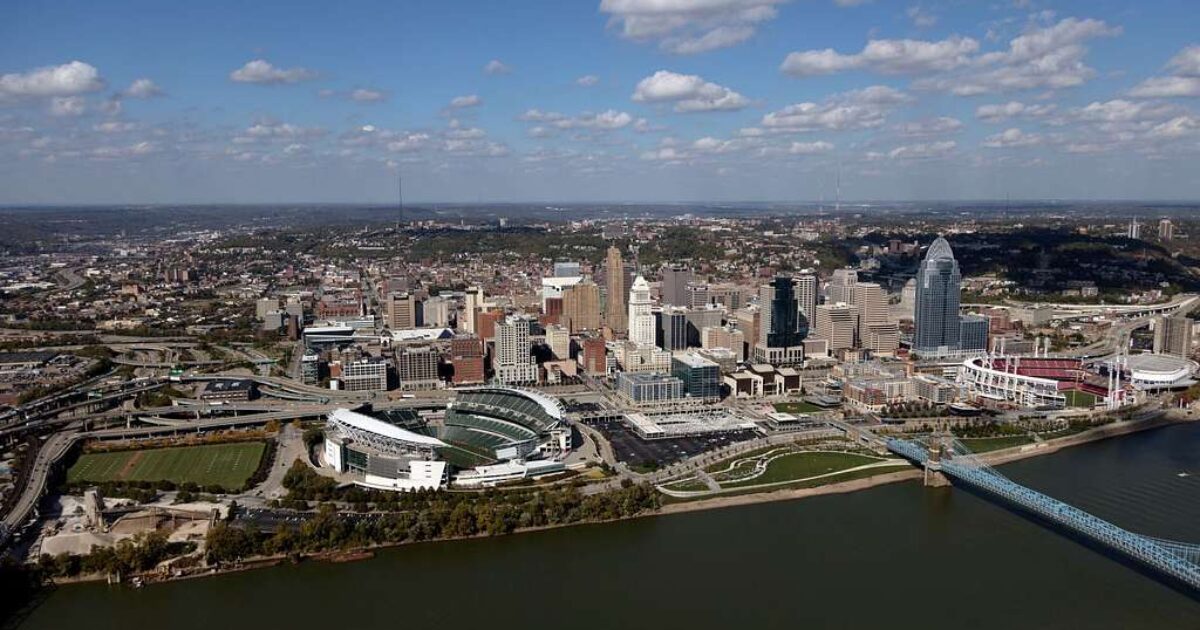The impact of the East Palestine train derailment is starting to hit major metropolitan areas.
The city of Cincinnati decided to shut off water intake from the Ohio River and switch to water reserves.
City officials and Greater Cincinnati Water Works (GCWW) announced the move Friday.
BREAKING: Greater Cincinnati Water Works is closing Cincinnati's water intake in the Ohio River ahead of anticipated contaminated water from the East Palestine train derailment, the agency announced Friday morning. https://t.co/dQKJkMVfRT
— WCPO 9 (@WCPO) February 17, 2023
Ohio train derailment worries expand, Cincinnati pauses Ohio River water intake https://t.co/zOgYE9V3ab
— Fox News (@FoxNews) February 18, 2023
Cincinnati is well over 200 miles from East Palestine.
Ohio Update: Authorities have found traces of toxic chemicals from the train derailment in the **Ohio river** near Cincinnati
For the record, Cincinnati is over 240 miles southwest from East Palestine
This is a regional crisis big media refuses to cover
https://t.co/GJLCMIQ2XX— DC_Draino (@DC_Draino) February 13, 2023
Sen. J.D. Vance (R-OH) spoke to Tucker Carlson days ago and asked why vinyl chloride is showing up in the Ohio River in Cincinnati.
JD Vance on Tucker: “Why is vinyl chloride showing up in the Ohio River in Cincinnati?”
It’s shameful the Biden Administration
cannot provide Ohio’s sitting U.S. Senator answers to his questions that impact Ohioans’ safety and well being. pic.twitter.com/LBpK9Lyeb8— Charles R Downs (@TheCharlesDowns) February 14, 2023
The City of Cincinnati issued this press release:
The City of Cincinnati and Greater Cincinnati Water Works (GCWW) are closely monitoring Ohio River water and are working diligently to ensure the safety of all Cincinnati-area residents following the recent train derailment and subsequent chemical spill in East Palestine, Ohio. Out of an abundance of caution, GCWW will shut off the Ohio River intake ahead of the anticipated arrival of the last detectable chemical concentration in the river. While the water intake is shut off, GCWW will temporarily switch to water reserves.
“Our City Administration is prepared for these types of events. I understand the concern, and I’m confident that temporarily shutting off the Ohio River intake is the best move,” said City Manager Sheryl Long. “There’s zero risk that our water reserves contain contaminants from the train derailment site, and tapping these reserves will give us all peace of mind. I want to thank GCWW, who are truly the best of the best, and state that I have full faith in their decision-making and their ability to keep us safe.”
“We are taking this preventative step to ensure the health, safety, and confidence of residents,” said Mayor Aftab. “Our entire community has East Palestine in our thoughts, and in coordination with the Ohio EPA and the Sanitation Commission, we will continue to support the best recovery possible. I am proud of the swift action of Water Works and City Manager Long in stepping up to protect our families.”
GCWW reserves are free from contaminants from the train derailment. While water reserves are being used, GCWW will continue monitoring the Ohio River to determine when it is safe to reactivate the intake. GCWW also plans to use additional optimized treatment once the intakes are reopened, even if no chemicals are detected.
“We continue to monitor the situation closely and stand ready to protect the quality of our drinking water. Ensuring a clean and safe water supply to customers is our top priority,” said GCWW Interim Director Verna Arnette.
GCWW continues to work with the Ohio EPA, Ohio River Valley Water Sanitation Commission (ORSANCO), and neighboring water utilities along the river to collect samples and perform additional analyses to assess any potential threat to our drinking water. GCWW has tested more than 130 water samples at the Ohio River water intake, and no detectable levels of the chemicals from the derailment site have been found. GCWW will continue testing water and posting test results online.
Fox News reported:
Ohio Gov. Mike DeWine tweeted on Wednesday that water testing results had shown no detection of contaminants in East Palestine’s municipal water system.
The governor on Friday repeated assurances that municipal water was safe, but added that a section of the Sulphur Run stream – located near the crash site – is still contaminated. Air and water testing would continue as long as necessary.
In response to skeptics, DeWine said that Ohio is using the best experts and equipment available, and that officials had no reason to lie or minimize the impact of the disaster.
The governor said that the Ohio River is very well monitored and that, for communities that are in contact with it, “the water that’s coming in that they’re testing is fine.”
“We rely on these people every day to make sure that water’s OK. They’re telling us that water’s OK,” he said.
After these video demonstrations of the waterways near East Palestine, who seriously believes Gov. DeWine or the EPA that the water is ‘safe?’
WATCH: East Palestine Residents Sound Off On Toxic Event Injuries—Biden Admin SILENT



Join the conversation!
Please share your thoughts about this article below. We value your opinions, and would love to see you add to the discussion!